#risks management
Text
This might seem like an "old man yells at cloud" situation, but it's just wild growing up and being told how dangerous distracted driving is - how, at highway speeds, you can traverse the length of a football field (100 yards, 91 meters) in a matter of seconds - how one split second sending a text while driving could result in a potential fatal crash, and then getting on the road as a driver and being surrounded by billboards. Their entire purpose is to catch one's attention, so they're lining major roads, which tend to be highways. How is it that you're told how important it is to never be distracted while driving, but still being advertised to?
At best, this type of advertising is an eyesore to pedestrians and motorists and a general waste of electricity to light it, and at worst, it is an active danger considering they are there to advertise and therefore, must catch people's attention.
I'm not even against advertising in theory, but this particular mode bothers me so much and I hate how pervasive it is - especially in large cities or highways.
#politics#i don't know much about são paulo banning marketing billboards but on paper i want that here in the USA#as a motorist it at best just makes me more anxious driving in those larger cities because i want to FOCUS ON THE ROAD#and passing 5000 billboards per mile isn't helping actually!#i've gotten good at filtering that out of my FOV but it's still fucking exhausting lol#i especially hate those modern electric billboards. despise them actually#i am aware that advertising is a critical aspect to business management in some cases...#...but it shouldn't risk the safety of the populous for you to advertise to them and i see things like billboards as risking safety...#...i feel similarly about online advertising in that so much of it risks internet user's safety...#...such as flashing ads online which risk triggering epileptic seizures in light/photo-sensitive folks#distracted driving (texting): NO >:( || distracted driving (being advertised to): YAYYYY :D#i've been driving on my own for a few years now and i've been thinking about this for ENTIRELY too long
3K notes
·
View notes
Text
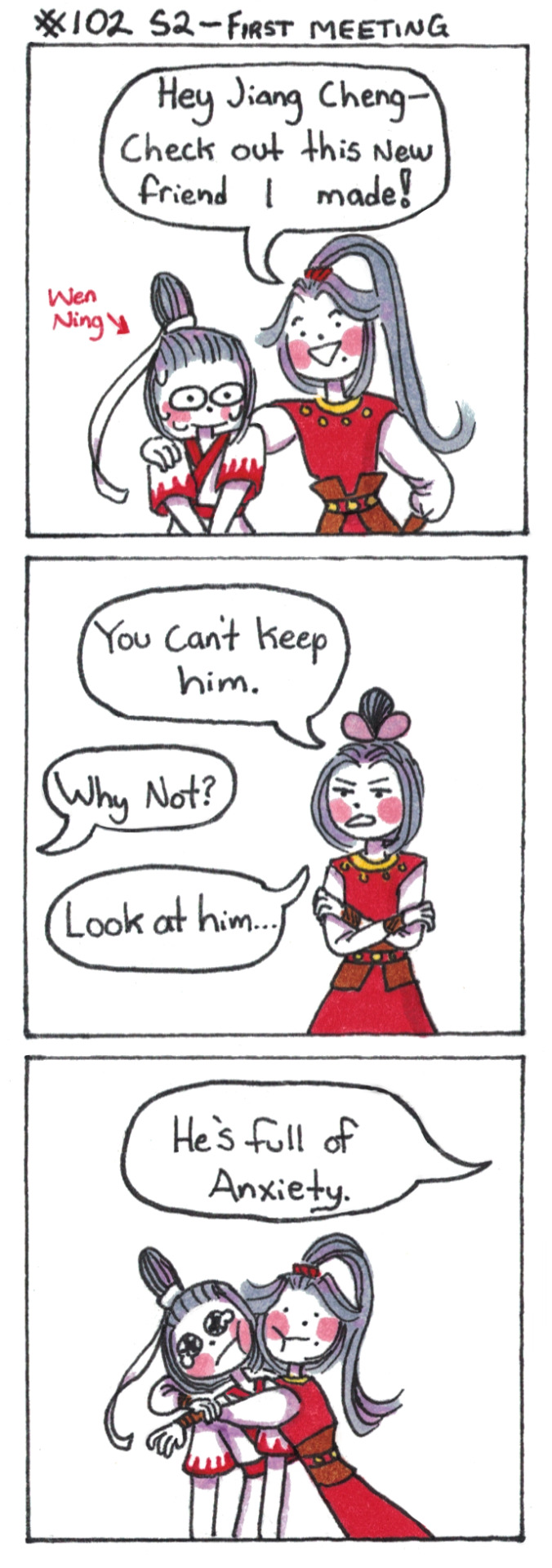
Introvert adoption
[First] Prev <–-> Next
#poorly drawn mdzs#mdzs#wei wuxian#wen ning#jiang cheng#(The actual name of this season 2 extra is 'First meeting with Wen Ning' but I ran out of space.)#I am obligated to try and wiggle in Wen Ning scenes whenever I can. Our baby boy needs his screentime to grow big and strong.#This whole scene is very good and does a lot to show us several important traits about wwx:#1) He has no hesitation to put his own face or life at risk to help someone (even if they have never met).#2) He does not care for what others say or think about him; he will do what he thinks is right.#And he is smart enough to think is is always right about his judgement. This will be a problem later.#I also think the silly energy in this scene is top notch.#Wen Ning is the wild chipmunk wwx managed to catch and wants to keep as a pet.#Jiang Cheng is gently easing this boy out of wwx's extrovert maw and saying 'put him back outside'.#Can you imagine being blindsided by the full force of wwx out of nowhere? Getting his support and then archery tips?#You're done. You've been caught in his snare and you aren't getting out.
2K notes
·
View notes
Text
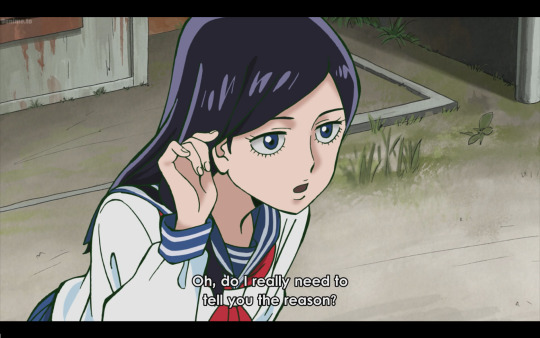

i've always enjoyed the way tsubomi is portrayed. she's not really part of the story and we don't know much about her outside of her being the target of mob's feelings and in a way a symbol or symbolic goal for his character arc - but that's the point! the point is that that's a shitty thing in a story and also in real life to do to another person!
she has a very strong feeling of having her own thing going on. she's not the love interest in a shounen series, she's a middle schooler with her own life and troubles. there's kind of a meta level to it too, how we as the audience are not entitled to find out every detail of her life, right? i like how understated her portrayal is while also being consistent with the things that we actually see of her true self are. truly, she's a strong person who knows what she's about.
specifically the conveyor belt of confessions and her justified annoyance at having to deal with the emotions of all these people that have cast her into the role of their love interest is just *chefs kiss* perfect and a mood
#mp100 spoilers#spoilers#honestly vibing the whole like#i don't even know you. you don't even know me#and having to manage other's emotions or risk social repercussions#this is some very sloppy analysis because i'm still in a food coma fgsdfgfds#special mention to the oh are you sure you want me to answer your question vibe in the first img#perfection
7K notes
·
View notes
Text
Never getting over the fact that Harry can literally solve all the case by himself but if he doesnt have Kim or Cuno to back him up (or have "Waste Land of Reality" thought internalised) his precinct just abandones him :(


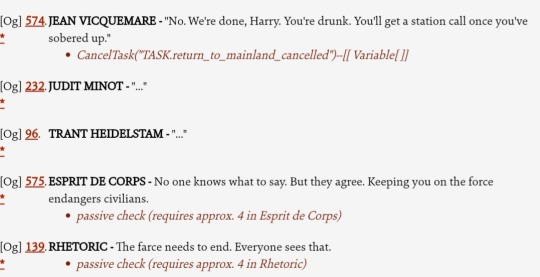

#disco elysium#“you managed not to die thus far. you manage it now” pls die jean <3#is this a “loyal” partner fanon has been talking about#“you almost got Kim killed” harry actually risked his life to protect civilians where the hell were you
694 notes
·
View notes
Text
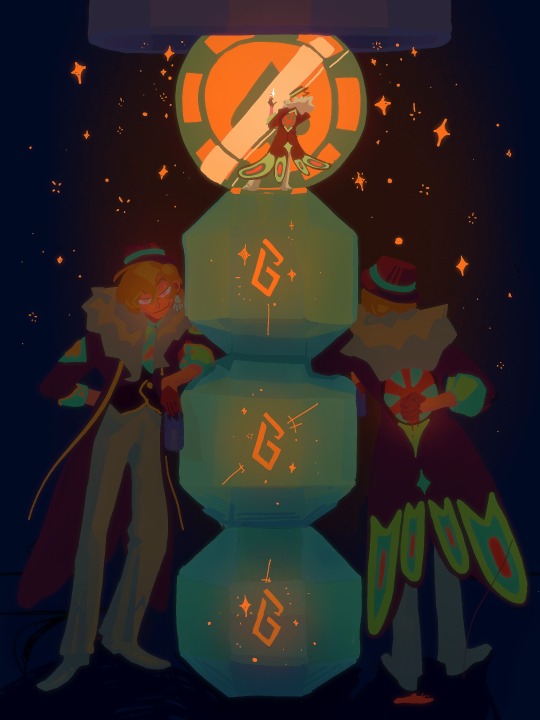
roll with it
the aventurine trailer???? so ill so ill so ill im on my knees he had one hand behind his back the whole time i'm shaking and sobbing and yes i am aware of that one random stroke on the bottom right but i drew this all on three layers so i can't fix it sorry folks
closeups below keep reading



#artwork#digital art#doodle#art#rkgkillust#honkai star rail#hsr#hsr fanart#illustration#aventurine#hsr aventurine#legitimately so sick over this trailer#my boy...#protect him#he feels fear#i have so many thoughts about his unhealthy relationship with risk-taking#all in he says#meanwhile im on my knees crying in the corner#sorry boothill he has my heart#and my e1s1 acheron has my damage so#shrugs it is what it is#also why do hsr designs have to be so godawfully complex#the only way i manage to draw them is to simplify them to hell and back
332 notes
·
View notes
Text


20.12.23, wednesday
My main hobby is just procrastinating in any way I can. The plan was to make a cup of coffee and then start working. What actually happened is that I watched a 3 part video series (by james hoffmann ofc) on Aeropress coffee and made a few cups with different variables. Still not sure if I found The Recipe for me, but it’s getting better (tho I don’t love the coffee beans I have)
#altho i’m not sure I agree that inverted method is not worth the risks#maybe I just pour my water in too slow (bc I get nervous abt pouring too much) but there’s a fair bit of liquid that manages to get through#before I can place the vacuum on there#so I did it with inverted method#what I took from his recipe was the swirling instead of stirring and letting it rest for 30secs after to get a more even bed of coffee#I did 14g of coffee & 200g of water with a 5min brew -> swirl -> another 30seconds of letting it rest before pressing gentlyy for like 20-3#seconds#but idk it’s a bit ’’one note’’#which could be the beans#I have medium roast rn and I prefer light roast but the light roast beans have been no where to be found lately idk why#(there aren’t many actual light roast beans and the other ones are waay out of my budget)#(or at least good ones; there’s the one affordable light roast that’s everywhere but I don’t like it that much (but tbf should’ve still#bought that instead of these ones I got))#like this is still way better than what the drip coffee of those beans are#and the achilles heel is that I don’t have a thermometer of any kind so my water temperature is guesswork every time#so tweaking variables is always a bit sketchy bc idk if I just had a better water temperature that time#studyblr#booklr#aesthetic#bookblr#books#study#reading#read#book#coffee#2023#december 2023
427 notes
·
View notes
Photo
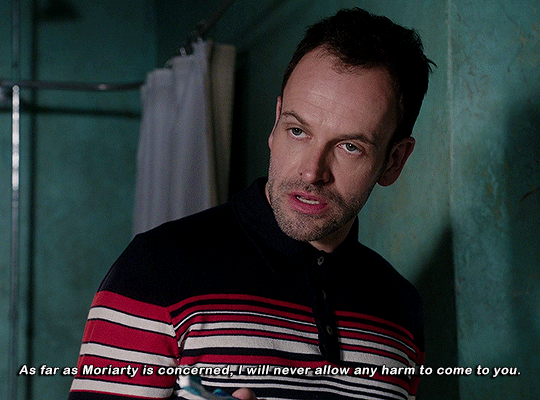

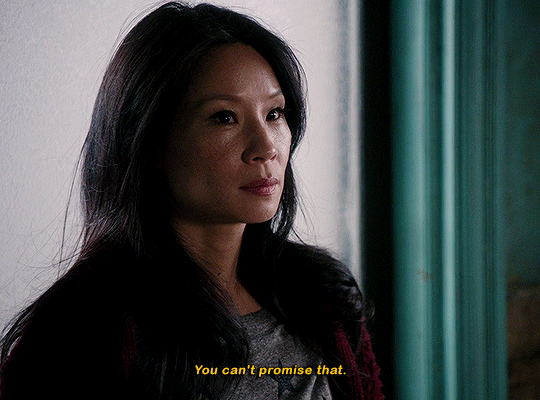

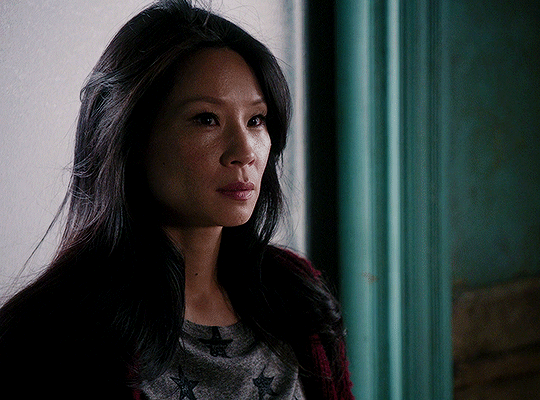
Well, there are ways to hurt you that do not involve hurting... you.
#elementary#elementaryedit#elementasquee#rjs*: new#risk management#ele s1#forever actual favorite#ugh it is so good#sherlock holmes#joan watson#brotp: you and i are bound
1K notes
·
View notes
Text
I don’t ever wanna hear anybody say that Firefighter Buckley doesn’t have leadership skills,,, that man single-handedly saved the entire 118 then went home and delivered a baby ???????
#the way he’s grown so much#instead of speaking himself when Athena asked where the captain was he deferred to hen#he helped everyone without panicking#he did a headcount instead of screaming#he immediately asked for a line from Ravi#when he didn’t hear back from Bobby he didn’t assume the worse#he just kept going#when the van fell he pushed everyone back instead of risking his own life#when chim was hanging from the truck he managed to climb and hold him#then bring him back carefully#that’s my interim captain right there#he deserves the world#buddie#911 fox#911#eddie diaz#evan buckley#911 tv show#evan buck buckley#buck x eddie#buck and eddie#911 abc#911 on abc
204 notes
·
View notes
Text
Insurance companies are making climate risk worse
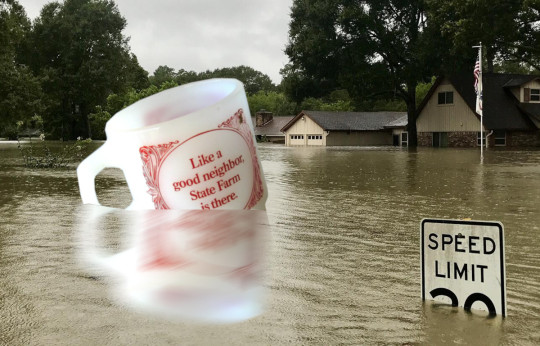
Tomorrow (November 29), I'm at NYC's Strand Books with my novel The Lost Cause, a solarpunk tale of hope and danger that Rebecca Solnit called "completely delightful."

Conservatives may deride the "reality-based community" as a drag on progress and commercial expansion, but even the most noxious pump-and-dump capitalism is supposed to remain tethered to reality by two unbreakable fetters: auditing and insurance:
https://en.wikipedia.org/wiki/Reality-based_community
No matter how much you value profit over ethics or human thriving, you still need honest books – even if you never show those books to the taxman or the marks. Even an outright scammer needs to know what's coming in and what's going out so they don't get caught in a liquidity trap (that is, "broke"), or overleveraged ("broke," again) exposed to market changes (you guessed it: "broke").
Unfortunately for capitalism, auditing is on its deathbed. The market is sewn up by the wildly corrupt and conflicted Big Four accounting firms that are the very definition of too big to fail/too big to jail. They keep cooking books on behalf of management to the detriment of investors. These double-entry fabrications conceal rot in giant, structurally important firms until they implode spectacularly and suddenly, leaving workers, suppliers, customers and investors in a state of utter higgeldy-piggeldy:
https://pluralistic.net/2022/11/29/great-andersens-ghost/#mene-mene-bezzle
In helping corporations defraud institutional investors, auditors are facilitating mass scale millionaire-on-billionaire violence, and while that may seem like the kind of fight where you're happy to see either party lose, there are inevitably a lot of noncombatants in the blast radius. Since the Enron collapse, the entire accounting sector has turned to quicksand, which is a big deal, given that it's what industrial capitalism's foundations are anchored to. There's a reason my last novel was a thriller about forensic accounting and Big Tech:
https://us.macmillan.com/books/9781250865847/red-team-blues
But accounting isn't the only bedrock that's been reduced to slurry here in capitalism's end-times. The insurance sector is meant to be an unshakably rational enterprise, imposing discipline on the rest of the economy. Sure, your company can do something stupid and reckless, but the insurance bill will be stonking, sufficient to consume the expected additional profits.
But the crash of 2008 made it clear that the largest insurance companies in the world were capable of the same wishful thinking, motivated reasoning, and short-termism that they were supposed to prevent in every other business. Without AIG – one of the largest insurers in the world – there would have been no Great Financial Crisis. The company knowingly underwrote hundreds of billions of dollars in junk bonds dressed up as AAA debt, and required a $180b bailout.
Still, many of us have nursed an ember of hope that the insurance sector would spur Big Finance and its pocket governments into taking the climate emergency seriously. When rising seas and wildfires and zoonotic plagues and famines and rolling refugee crises make cities, businesses, and homes uninsurable risks, then insurers will stop writing policies and the doom will become undeniable. Money talks, bullshit walks.
But while insurers have begun to withdraw from the most climate-endangered places (or crank up premiums), the net effect is to decrease climate resilience and increase risk, creating a "climate risk doom loop" that Advait Arun lays out brilliantly for Phenomenal World:
https://www.phenomenalworld.org/analysis/the-doom-loop/
Part of the problem is political: as people move into high-risk areas (flood-prone coastal cities, fire-threatened urban-wildlife interfaces), politicians are pulling out all the stops to keep insurers from disinvesting in these high-risk zones. They're loosening insurance regs, subsidizing policies, and imposing "disaster risk fees" on everyone in the region.
But the insurance companies themselves are simply not responding aggressively enough to the rising risk. Climate risk is correlated, after all: when everyone in a region is at flood risk, then everyone will be making a claim on the insurance company when the waters come. The insurance trick of spreading risk only works if the risks to everyone in that spread aren't correlated.
Perversely, insurance companies are heavily invested in fossil fuel companies, these being reliable money-spinners where an insurer can park and grow your premiums, on the assumption that most of the people in the risk pool won't file claims at the same time. But those same fossil-fuel assets produce the very correlated risk that could bring down the whole system.
The system is in trouble. US claims from "natural disasters" are topping $100b/year – up from $4.6b in 2000. Home insurance premiums are up (21%!), but it's not enough, especially in drowning Florida and Texas (which is also both roasting and freezing):
https://grist.org/economics/as-climate-risks-mount-the-insurance-safety-net-is-collapsing/
Insurers who put premiums up to cover this new risk run into a paradox: the higher premiums get, the more risk-tolerant customers get. When flood insurance is cheap, lots of homeowners will stump up for it and create a big, uncorrelated risk-pool. When premiums skyrocket, the only people who buy flood policies are homeowners who are dead certain their house is gonna get flooded out and soon. Now you have a risk pool consisting solely of highly correlated, high risk homes. The technical term for this in the insurance trade is: "bad."
But it gets worse: people who decide not to buy policies as prices go up may be doing their own "motivated reasoning" and "mispricing their risk." That is, they may decide, "If I can't afford to move, and I can't afford to sell my house because it's in a flood-zone, and I can't afford insurance, I guess that means I'm going to live here and be uninsured and hope for the best."
This is also bad. The amount of uninsured losses from US climate disaster "dwarfs" insured losses:
https://www.reuters.com/business/environment/hurricanes-floods-bring-120-billion-insurance-losses-2022-2023-01-09/
Here's the doom-loop in a nutshell:
As carbon emissions continue to accumulate, more people are put at risk of climate disaster, while the damages from those disasters intensifies. Vulnerability will drive disinvestment, which in turn exacerbates vulnerability.
Also: the browner and poorer you are, the worse you have it: you are impacted "first and worst":
https://www.climaterealityproject.org/frontline-fenceline-communities
As Arun writes, "Tinkering with insurance markets will not solve their real issues—we must patch the gaping holes in the financial system itself." We have to end the loop that sees the poorest places least insured, and the loss of insurance leading to abandonment by people with money and agency, which zeroes out the budget for climate remediation and resiliency where it is most needed.
The insurance sector is part of the finance industry, and it is disinvesting in climate-endagered places and instead doubling down on its bets on fossil fuels. We can't rely on the insurance sector to discipline other industries by generating "price signals" about the true underlying climate risk. And insurance doesn't just invest in fossil fuels – they're also a major buyer of municipal and state bonds, which means they're part of the "bond vigilante" investors whose decisions constrain the ability of cities to raise and spend money for climate remediation.
When American cities, territories and regions can't float bonds, they historically get taken over and handed to an unelected "control board" who represents distant creditors, not citizens. This is especially true when the people who live in those places are Black or brown – think Puerto Rico or Detroit or Flint. These control board administrators make creditors whole by tearing the people apart.
This is the real doom loop: insurers pull out of poor places threatened by climate disasters. They invest in the fossil fuels that worsen those disasters. They join with bond vigilantes to force disinvestment from infrastructure maintenance and resiliency in those places. Then, the next climate disaster creates more uninsured losses. Lather, rinse, repeat.
Finance and insurance are betting heavily on climate risk modeling – not to avert this crisis, but to ensure that their finances remain intact though it. What's more, it won't work. As climate effects get bigger, they get less predictable – and harder to avoid. The point of insurance is spreading risk, not reducing it. We shouldn't and can't rely on insurance creating price-signals to reduce our climate risk.
But the climate doom-loop can be put in reverse – not by market spending, but by public spending. As Arun writes, we need to create "a global investment architecture that is safe for spending":
https://tanjasail.wordpress.com/2023/10/06/a-world-safe-for-spending/
Public investment in emissions reduction and resiliency can offset climate risk, by reducing future global warming and by making places better prepared to endure the weather and other events that are locked in by past emissions. A just transition will "loosen liquidity constraints on investment in communities made vulnerable by the financial system."
Austerity is a bad investment strategy. Failure to maintain and improve infrastructure doesn't just shift costs into the future, it increases those costs far in excess of any rational discount based on the time value of money. Public institutions should discipline markets, not the other way around. Don't give Wall Street a veto over our climate spending. A National Investment Authority could subordinate markets to human thriving:
https://democracyjournal.org/arguments/industrial-policy-requires-public-not-just-private-equity/
Insurance need not be pitted against human survival. Saving the cities and regions whose bonds are held by insurance companies is good for those companies: "Breaking the climate risk doom loop is the best disaster insurance policy money can buy."
I found Arun's work to be especially bracing because of the book I'm touring now, The Lost Cause, a solarpunk novel set in a world in which vast public investment is being made to address the climate emergency that is everywhere and all at once:
https://us.macmillan.com/books/9781250865939/the-lost-cause
There is something profoundly hopeful about the belief that we can do something about these foreseeable disasters – rather than remaining frozen in place until the disaster is upon us and it's too late. As Rebecca Solnit says, inhabiting this place in your imagination is "Completely delightful. Neither utopian nor dystopian, it portrays life in SoCal in a future woven from our successes (Green New Deal!), failures (climate chaos anyway), and unresolved conflicts (old MAGA dudes). I loved it."

If you'd like an essay-formatted version of this post to read or share, here's a link to it on pluralistic.net, my surveillance-free, ad-free, tracker-free blog:
https://pluralistic.net/2023/11/28/re-re-reinsurance/#useless-price-signals
#pluralistic#doom loop#insurance#insuretech#climate#climate risk#climate emergency#the lost cause#market forces#risk management#price signals#control boards#decarbonization#bond vigilantes#climate resilience
261 notes
·
View notes
Text
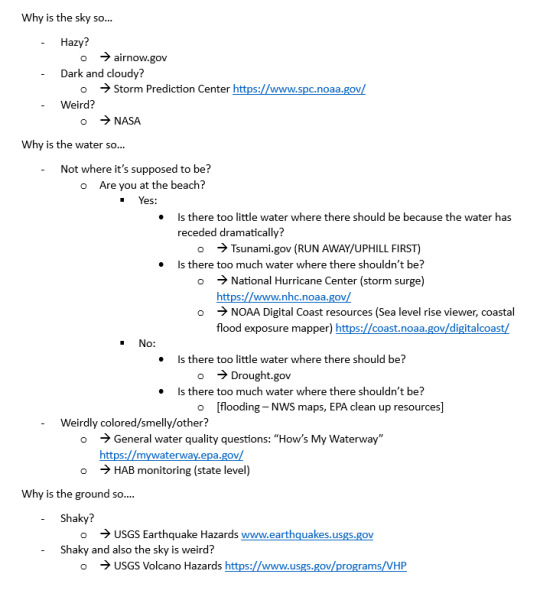
Since the wildfire smoke has been hitting the east coast, I've been thinking about doing a flowchart-style infographic on where to find US hazard information - so many of the comments on the info I posted were like "huh. I was wondering why the sky looked so funny." With the state of the Internet, search engines, and social media today, it really isn't intuitive where you can go to find reliable information on something so vague as "I noticed something a lil funky today," and so many of the platforms and accounts that emergency managers have spent years building up trust and visibility for have disappeared or become unverifiable because of Twitter's meltdown. Best to go to straight to the source when you can, as long as you know where to start.
This would just focus on the federal government, and mainly on immediate warnings and alert information...I'd rather just focus on natural hazards as well since those are the resources I'm familiar with, but that might be too narrow. Any ideas for questions and flowpaths besides what I've sketched out so far are welcome!
#social media and esp Twitter has become such a core piece of the emergency communications ecosystems over the last 20 years#that i think the whole crisis management space is still reeling over how quickly it has deteriorated#this post also brought to you by all my friends who recently moved to california & keep texting me 'how do i know if that was an eq or not'#hazards#disasters#disaster awareness#disaster preparedness#risk communication
348 notes
·
View notes
Text
oh railroad rush looks so fun and also like a game teams won’t fully get a handle on until at least a few events in. I cannot WAIT it looks like it’ll be so cool (and I love the games that focus on teamwork and time management so much which this ABSOLUTELY is)!
#mcc#also I see people comparing it to grid runners and YEAH KINDA#but I sort of suspect this one will also lean on your sands skills actually#not in the SAME risk management way but a similar resource and risk management way!#also sort of in the buildmart corner here#HUGE fan
86 notes
·
View notes
Text
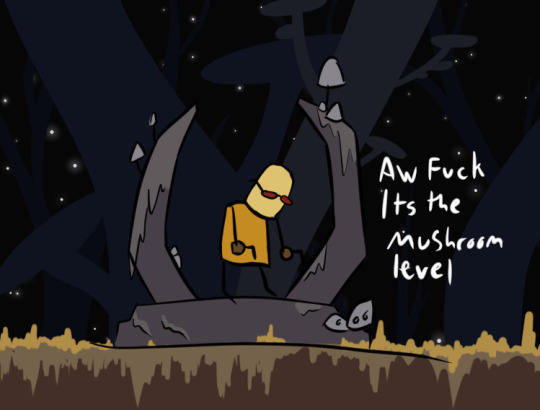
yeah
#risk of rain returns#risk of rain#art block is so fun#all i can manage to complete is colouring in bits from an old doodlepage#and this one isnt even the most recent one#its just the only presentable one
124 notes
·
View notes
Text
The reason I say I think kink is a powerful tool of queer liberation is because queer kink is visually, philosophically, culturally, very resistant to true assimilation. The full extent of queer kink is not marketable, it is not palatable, it is inherently weird and deviant because kink intentionally engages in the unsavory, the taboo, the difficult and strange. It lays power and how it functions very bare. It subverts socially engrained power structures constantly. It plays with things that society fears. I also think kink would be sociologically considered forbidden knowledge, and this also makes its assimilation into hegemonic culture very difficult.
Kink cannot be clearly and openly advertised and marketed because of this forbidden knowledge; it's offensive to almost all cultural standards. (This is a GOOD thing.) It cannot be conveniently standardized. It is and always will be unappealing to a large portion of people, because BDSM WILL engage in play with scenarios that are genuinely and understandably upsetting. (It is very much like horror in this way.) And because of the risk involved in Hard/More Risky BDSM, I don't think it should ever become culturally normalised. It is something that requires a community that ensures participants have the proper education, guidance, good intentions and standards, and is capable of pushing out bad actors to protect people. I think safety information should be plentiful and accessible, but I don't think it should (or really could) be "normalised".
I think thats powerful! I'm so glad we have furries, pup-players, piss drinkers and adult babies to keep at least one corner of culture inpenetrable to heteronormative hegemoneity.
#kinkposting#also like. build queer solidarity by killing the sex cop in your head :) kink shaming does literally no good.#shame people for bad consent practice and predatory behavior!#and also bad play as far as risk management n shit. pls get educated before you do risky play guys
120 notes
·
View notes
Note
I'm sorry if this is of any inconvenience but I was wondering how do you have the courage to post your art online cause iwant to do it to someday but I just can't find the right drawing though I've tried I can't figure it out like how do you do this wonderful stuff without worrying about hate or anything?
The main advice I can really give you is just. Don’t. worry about that.
People online will be mean, sometimes. Sometimes accidentally, sometimes with an understandable criticism, sometimes just for the sake of getting a response. Take it all with a grain of salt and curate who you follow and who you see on your dash and in tags if you’re that worried about it. I think when you post your art or anything you do online, that’s just something that has a possibility of happening no matter what you do.
Also I just really think it’s unlikely that anyone’s gonna just send you anon hate because you posted some drawings, unless they’re, like, objectively offensive for the sake of being offensive, or something.
Just try not to take social media too seriously, IMO. When I started posting here I posted grainy iPhone camera doodles of Transistor fan art from my school notebook cuz I liked the game and wanted to see if other people liked it, too. I wanted a place to put the things I drew and a place where I could track my progress as I posted my art over the years, and maybe even meet people. If that’s what you want your eventual art blog to be, then that’s all it really needs to be.
If it’s something more practical you’re looking for: when I was starting out, I would load up the post I wanted to make, hover over the post button, and count down from ten. When I hit one, I just post it, no matter what. If I really didn’t like the post, I could just delete it.
#I don’t mean to sound blunt or make it sound like it’s so easy#like I get it#I’ve gone through stuff like this as well#I still have my highs and lows of managing anxiety depresssive episodes burnout etc#it’s hard. especially if you use Twitter or something and are constantly seeing people yelling at eachother for whatever reason#but if I were you I’d weigh out the pros and cons:#is showing off your work worth the risk of having to deal with the possibility of people being mean to you online?#it’s ok if it is or if it isn’t but no one else can decide that for you#ALSO ALSO#like I said: posting REALLY REALLY does NOT have to be a big deal#post whatever#post a scribble you did of a dog you saw at a park#just make sure it’s what YOU want to post
214 notes
·
View notes
Text
if you've been here a while you know i have a bunch of AUs with the premise "kid!karin gets her ass out of grass, usually semi-accidentally, sometimes being basically kidnapped." and i think "minakushi survive and take karin in as their own" is the BEST possible outcome for her (besides AUs where her mom also survives but her mom isn't a real character so i always have her already dead). and for the minakushi AUs i have, i think they all center around karin being in konoha for the chunin exams and minato being like "haha, you're not getting her back :)" but the much FUNNIER option is
minato: (teleports into karin's living room) hi uh no time to talk but my wife knew your mom and
karin, who pays attention in class: the hokage???
minato: (grabs her and teleports away)
#the au im rotating is basically that karin's mom was in contact with kushina#she turned down an offer to move to konoha bc she married a grass-nin and she and karin were comfortable#but her husband died and then her situation went south REAL fast#including grass cutting off her communications with konoha#but she managed to get a plea for help to kushina and kushina managed to send her back a hiraishin seal#but they were unable to coordinate anything in a timely manner#(bc minato being caught in grass risks things like WAR so they need that coordination)#but konoha received the intel karin's mom passed and kushina lost her mind#and minato was like 'fine i will just pop in and out REAL fast'#thank god karin was in the privacy of her own home and also near the hiraishin marker#....although minato being sighted by her entire academy class would be funnier#anyway it takes a while for grass to figure out where tf karin went#and when she pops up in konoha they send an angry letter and minato is like#'whaaaat? she just showed up and said you let her..........'#and blinks his beautiful himbo eyes a few times
137 notes
·
View notes